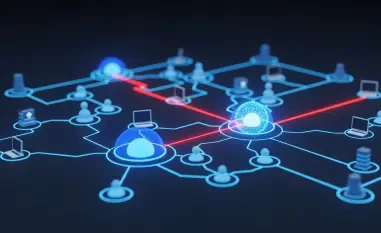In recent years, Russian hackers have drawn increasing scrutiny for their suspected involvement in high-profile cyber espionage campaigns. Operation RoundPress stands as a particularly alarming example, suspected to originate from the cyber group Fancy Bear. This campaign is believed to target organizations linked to ongoing geopolitical tensions, especially surrounding the Ukraine conflict. The sophisticated use of spearphishing emails exploiting vulnerabilities in widely used webmail platforms forms the crux of the issue, raising concerns about global cybersecurity.
Unveiling the Cyber Underworld: The Rise of Email Exploits
Email systems, widely revered for their indispensable role in communication, have inadvertently become fertile ground for cybercriminal activities. Experts highlight that platforms like Roundcube, Horde, MDaemon, and Zimbra are consistently targeted due to unpatched vulnerabilities. Some analysts argue that Fancy Bear has evolved its strategies over time, moving from Roundcube-specific exploits to a broader spectrum encompassing multiple platforms. This evolution showcases the adaptive nature of cyber tactics, often outpacing traditional security measures.
The global reach of Operation RoundPress serves as a sobering reminder of the interconnected nature of modern cybersecurity threats. No region remains untouched, with attacks recorded across Europe, Africa, and South America. Security experts warn that these campaigns are not mere isolated incidents but represent a broader trend in cyber espionage. The implications of such attacks rarely confine themselves to national borders, making international cooperation essential in response efforts.
Fancy Bear and Cyber Tactics
Fancy Bear’s Cyber Tactics: A Deep Dive Into Their Methods
Fancy Bear, also recognized as Sednit or APT28, is emblematic of sophisticated cyber adversaries. Their utilization of well-crafted spearphishing emails enables them to bypass security filters efficiently. Specialists point out that the group’s focus on exploiting Cross-Site Scripting (XSS) vulnerabilities underscores their commitment to identifying and employing complex attack vectors. This deliberate approach helps ensure the success and longevity of their cyber operations.
Cybersecurity analysts frequently debate the nuanced role of state-affiliated groups like Fancy Bear. While some stress that these groups prioritize espionage to align with geopolitical interests, others caution against underestimating their potential for indiscriminate damage. This ongoing debate reflects the broader challenges faced by the cybersecurity community as it seeks to unravel the motivations and strategies underpinning such sophisticated attacks.
Beyond Fancy Bear: The Broader Landscape of Webmail Vulnerabilities
As attention sharpens on Fancy Bear, other groups like GreenCube and Winter Vivern also exploit email vulnerabilities. These groups target less-maintained servers to achieve comparable objectives, demonstrating the persistent threat posed by outdated or unpatched systems. Analysts emphasize the need for a holistic cybersecurity approach, addressing the pervasive weaknesses across multiple platforms rather than focusing solely on high-profile actors.
Industries worldwide have witnessed significant impacts from cyber warfare, with defense, government, and even financial sectors increasingly targeted. Cybersecurity professionals continuously reflect on case studies, examining the complex interplay between cyber defenses and vulnerabilities. Such analyses are crucial in understanding the potential fallout of cyber incidents on both industry and national security landscapes.
The Evolving Toolbox: Emerging Trends in Email Exploitation Tactics
The rapid evolution of email exploitation techniques presents a dynamic challenge for cybersecurity initiatives. While some trends mirror traditional methods, others introduce novel approaches designed to subvert emerging security features. Specialists highlight that understanding these evolving tactics is vital for developing proactive countermeasures and ensuring cyber resilience.
Different regions demonstrate varied responses to cybersecurity threats. While some emphasize technology upgrades, others focus on governmental regulations. Evaluating these diverse perspectives helps establish a more nuanced understanding of global cybersecurity landscapes. Such assessments facilitate tailored strategies, sensitive to regional vulnerabilities while maintaining universal security standards.
Expanding the Analysis: Cyber Espionage and Global Geopolitical Tensions
A Synergistic View: Cyber Espionage and Global Geopolitical Tensions
The intersection of cyber espionage and international politics becomes increasingly evident in campaigns like Operation RoundPress. Observers note how cyber operations often mirror geopolitical tensions, serving as tools for information gathering and influence. This interconnectedness prompts calls for enhanced dialogue between nations to mitigate cyber threats and promote a safer digital environment.
Predicting the future trajectory of cyber threats requires expert insights into potential developments. Analysts suggest that evolving attack techniques and the geopolitical context could dictate the nature and scope of upcoming cyber campaigns. Recognizing these potential shifts allows organizations and governments to implement effective and timely defense strategies.
Recapping the Cyber Frontier: Major Insights and Learnings
The exploration of Fancy Bear and similar cyber groups provides a deeper understanding of the modern cyber threat landscape. Effective responses depend on awareness, education, and strategic security enhancements. Prioritizing cybersecurity initiatives ensures systems can resist and recover from attacks, safeguarding vital data and infrastructure.
Strengthening cybersecurity requires integrating best practices at individual and organizational levels. Experts recommend robust defense mechanisms like regular updates, multi-factor authentication, and vigilant monitoring. Empowering individuals through education fosters a security-conscious culture, reducing susceptibility to cyber threats.
Connecting Themes and Drawing Conclusions
As Operation RoundPress highlights, the threat posed by cyber espionage is both significant and expanding. The narrative around Fancy Bear and analogous groups encapsulates crucial lessons for global cybersecurity endeavors. Recognizing the complexity and reach of these campaigns reinforces the necessity of shared vigilance and adaptation.
The ongoing battle against cyber threats demands unwavering attention and innovation. Solutions require collective engagement, fostering collaboration across sectors and borders. By remaining proactive and informed, stakeholders across the digital landscape can effectively navigate cybersecurity challenges and safeguard the information that underpins modern society.













